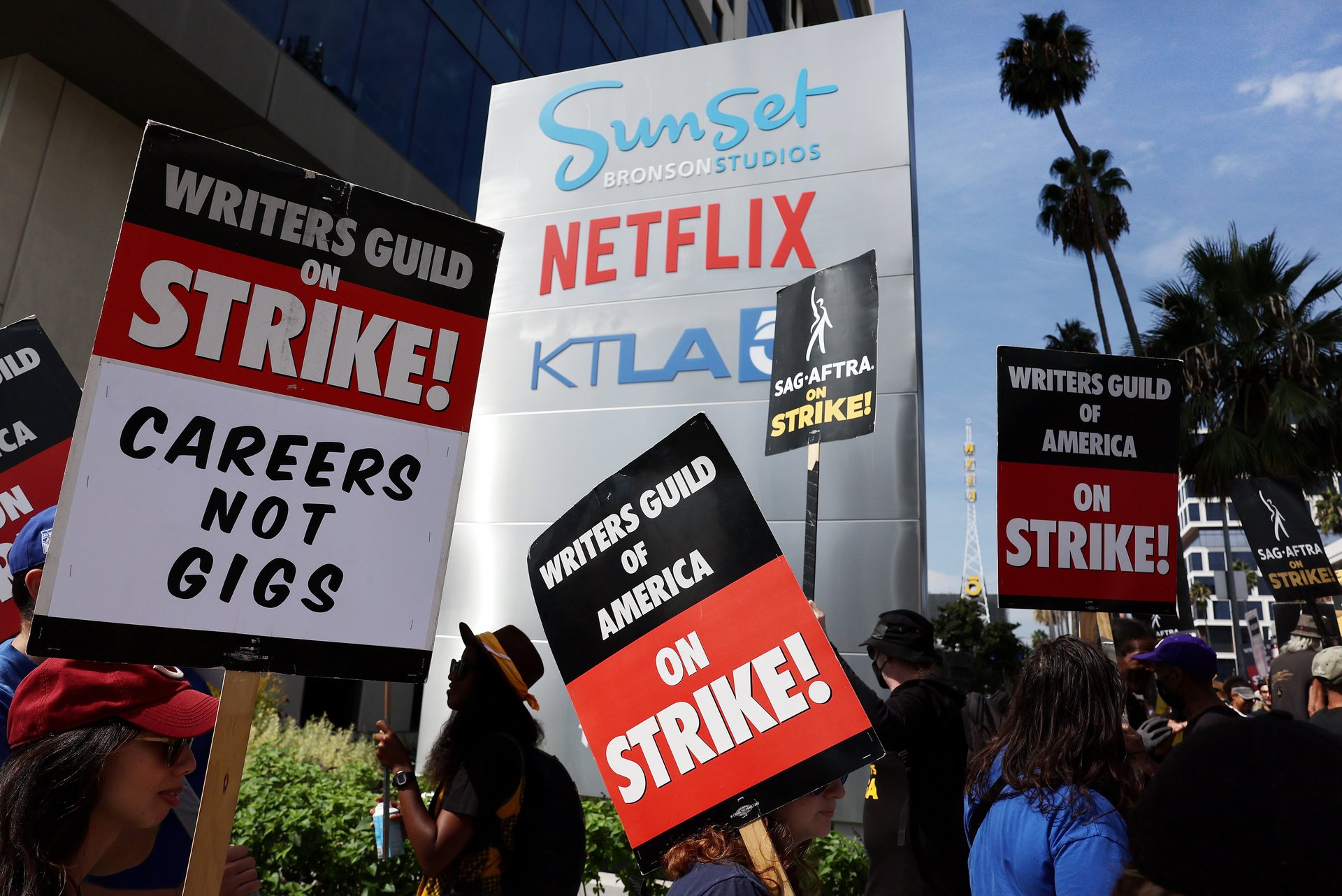Hollywood's writers have a deal—and little to do while actors are still striking
As the WGA approaches an agreement with studios, talk shows like Stephen Colbert’s could start up again, but not much else

Screenwriters and Hollywood studios have come to a tentative agreement to finally end a historic, five-month-long strike that brought show business in the US to a standstill. The Writers Guild of America West (WGAW) announced yesterday (Sept. 24) that it reached a deal with the Alliance of Motion Picture and Television Producers (AMPTP) after 146 days of striking. Details of the contract have yet to be disclosed, but the union said it was pleased with the terms on offer.
Suggested Reading
“We can say, with great pride, that this deal is exceptional—with meaningful gains and protections for writers in every sector of the membership,” the WGA wrote in a letter to its members, as published by Deadline. “What remains now is for our staff to make sure everything we have agreed to is codified in final contract language.”
Related Content
If ratified, the new contract, hashed out over five days of talks with studio representatives last week, would go into effect for the next three years. The ratification is likely but not guaranteed. Until that happens, union members will continue to be on strike.
The WGA has suspended its picketing and is now encouraging its members to join striking colleagues in the Screen Actors Guild-American Federation of Television and Radio Artists (SAG-AFTRA) union. The actors could use the boost. SAG-AFTRA has yet to arrive at a deal with studios, which means work for screenwriters is more or less stalled, even if their own deal is approved.
Shows that can start up as soon as studios and screenwriters reach a deal
Late-night talk shows, including “The Late Show with Stephen Colbert” and “The Tonight Show Starring Jimmy Fallon,” could restart once the new agreement goes into effect. Daytime shows like “The Drew Barrymore Show” (which stirred up its own controversy by breaking the strike and starting up before any deal was reached) and “The Jennifer Hudson show” may also make a quick return.
But larger productions, such as the fifth season of “Stranger Things” and the franchise film “Deadpool 3,” remain hampered as SAG-AFTRA and studios continue to circle the bargaining table. Celebrity guest appearances on the restarted talk shows would also be unlikely, or the shows would at the very least have slimmer pickings, given the actors’ strike.
That said, the WGA’s headway could spur a similar breakthrough for the actors’ union. SAG-AFTRA has been keeping an eye on the WGA’s developments. “We look forward to reviewing the terms of the WGA and AMPTP’s tentative agreement,” the union said in a statement published on X (formerly Twitter). “And we remain ready to resume our own negotiations with the AMPTP as soon as they are prepared to engage on our proposals in a meaningful way.”
One Big Number: 153 days
The WGA, which struck its tentative agreement after 146 days on the picket line, is now poised to break the record for the longest strike in its history. The current record, of 153 days, was set during the 1960 writers’ strike. Surpassing that marker is likely, as ratifying the new contract will take time. Both WGA boards, east and west, need to approve the deal, after which the 11,500 odd members of WGAW will need to vote on the contract.
Hollywood may see more strikes in 2024
While the WGA’s historic strike may be winding down, there could be more walkouts on the horizon in Hollywood. The International Alliance of Theatrical Stage Employees (IATSE), which represents technicians, artists, and craftspeople in the entertainment industry, is up for a contract renewal with the AMPTP in 2024. IATSE has over 170,000 members, according to its website, and has several prominent chapters located in Los Angeles, Burbank, and New York City.
